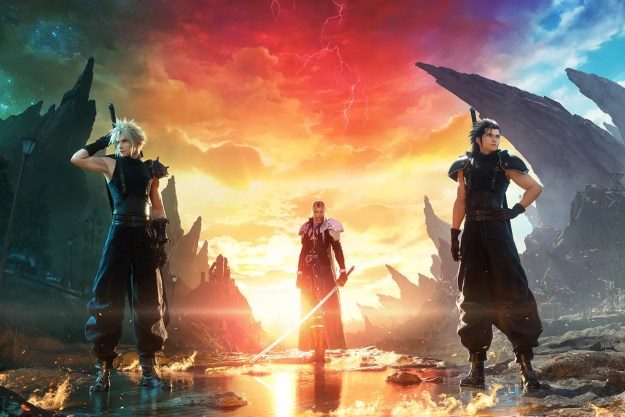Growing up without a father leaves a mark. How deep and debilitating that mark ends up being will vary based on each individual and on the situation that caused it in the first place. For me, my father marked me by cheating on my mother and all but abandoning me for the majority of my adolescence. All I wanted was an escape from my new reality at that time, and games like Final Fantasy offered it to me.
The theme of fatherhood is present throughout the RPG series, but is almost never the direct focus. The examination of lineage, if not specifically a father-child relationship, instead is most often used in building and fleshing out characters.
Fully investing myself into those stories and characters was my coping mechanism for the sense of chaos and helplessness I experienced during that difficult period of my childhood — not as a way to avoid or escape it, but to teach me how to rationalize it. Without these games, I may not have ever come to understand myself, or my father, as deeply as I do today.
A recurring theme
While fatherhood is a recurring theme throughout the Final Fantasy titles, some feature it more prominently than others. Final Fantasy XV has a character point where Noctis feels closest to his father when driving his car. That leads into a larger theme about found family, as the game’s four leads become a support system for one another, filling the absence of traditional family dynamics. Just the banter between the crew during a normal battle had me grinning, and dialogue scenes around a campfire or during long car rides felt so real that I caught myself tearing up for what seemed like no reason.
Adopted families and father figures can be found across the series as well, from Barret and Marlene to Terra and the crew of Final Fantasy VI. Simultaneously, games like Final Fantasy VII show the parallels of how people can deal with a lack of a father figure. Cloud chooses to devote himself to others (even if he won’t admit it at first), and even goes on to take in orphans, while Sephiroth becomes so distraught and enraged by his origins that he lashes out at everyone and everything.
I’m ashamed to say that I’ve been both Cloud and Sephiroth in my life. If I hadn’t had that example shown to me, even subconsciously, I may not have broken away from the rage I felt myself feeding and been able to tell my own story. But it was Final Fantasy X that would resonate most deeply with my personal situation.

Without diving deep into the specifics of it all, the reason for my parent’s divorce came down to my father cheating on my mother. When I learned this, I had a hard time grasping it. The perspective I had of my father as a child was that of a somewhat goofy, rock ‘n’ roll-playing, but ultimately normal man. It was rare to see him angry, and it seemed like he was friends with everyone. After my siblings and I were told about the split, he almost completely vanished from our lives.
During this time, I picked up Final Fantasy X, VII, and Kingdom Hearts, among many others — and those were the games that saved me. What I wasn’t aware of was a common theme shared by all these titles: fatherhood. Each game, to some degree, deals with that theme in different ways. Final Fantasy X, by happy coincidence, turned out to be the perfect game to play at that stage in my life, even if I didn’t know it at the time.
Tidus’ relationship with his father, Jecht, can be read as a somewhat universal allegory for all father-son relationships, but most prominently for strained relationships. Jecht is a celebrity, a star that everyone loves and adores. However, a great father and husband, he is not. Tidus grows up despising his father, which comes to a head when he learns that he has become Sin, the incarnation of evil that terrorizes the world of Spira. He follows in his father’s footsteps, learning about the man he hated, but never really knew along the way.
While I didn’t initially harbor hate for my father, speaking to those who knew him outside of my context, as Tidus did with the people of Spira, I began to develop those feelings. Just as Tidus felt so frustrated learning how everyone seemed to love and admire Jecht, I had to hold back my anger when hearing people speak highly of him while knowing what I knew. When all is finally revealed, Tidus understands the motivation behind his father’s actions, but doesn’t accept them as right or resign himself to make those same choices. The same became true for me.
Jecht was also a small beacon of hope for me. While he disappeared from Tidus’ life, Jecht went on a pilgrimage, got sober, and became a good man. My father fell further into substances, dove deeper into narcissism, and became even more destructive. When Jecht was thrust into his situation, he became a better man — a better father — while my father only changed for the worse. Jecht became Sin out of selflessness; my father became my Sin out of selfishness.
It may sound like hyperbole to compare my father to Sin, but at that age, it didn’t feel like an exaggeration. In one action, he destroyed the life I had, the comforts I relied on, and the future I expected. We had to sell our home, and I bounced between schools and lost any semblance of a space I could feel safe in. It wasn’t quite Tidus being spirited away to Spira, but I certainly couldn’t go home again.
As is common in life, I never got a “final confrontation” with my father in the same way Tidus did, and there were no good intentions obscured behind his evil actions. Instead, my reckoning with who he really was and how that changed who I wanted to be took years.
My crisis core
The immediate time after the divorce left me more alone than I’d ever been. It came right at the time when both my older siblings were either already moved out or just about to, leaving me with only my mother. I could never give enough credit for how much my mother was there for me at that time, but there was no avoiding my sense of identity loss. I didn’t know who I wanted to be, only that I didn’t want to be my father.
Enter Cloud and Final Fantasy 7. Being a young and impressionable kid, I clung to Cloud’s “too cool” demeanor and attitude. He was a strong, reliable, and capable hero, who, funnily enough, also lacked a father. It was a persona I desperately tried to embody.
The part of Cloud’s story that almost felt targeted at me specifically was the revelation that Cloud himself was an imposter. He had unknowingly taken on the personality of his own mentor, Zack, after suffering his own traumatic event. In the real world, we aren’t given the luxury of actually exploring our own minds to untangle our twisted insecurities and personalities shaped by our pasts so easily. Still, seeing Cloud go through that was a major step in my realizing that having mentors and people to look up to was important, but not to the point of sacrificing my own personality.

Almost 20 years on from the divorce, I still haven’t fully unraveled how it has shaped me as a person. I doubt I ever will, and accept it as something that I will have to continue to work on. What I can do is look at games, Final Fantasy and otherwise, as exercises in exploring concepts and feelings within myself that I might not have otherwise directly addressed.
Being a kid is already the most vulnerable time in our lives. What happens during those years is what sets us on a path for the rest of our lives, and we’re almost never in control of those forces. Being thrust into a divorce amplified that whirlwind of chaos in my life. I lost my family, my home, my sense of self, and also my future.
Final Fantasy offered me some solid ground — not as a way to escape or ignore what was happening to me, but to give me the tools and space to self-actualize and become the author of my own story.
Editors' Recommendations
- In defense of Final Fantasy 7 Rebirth’s polarizing ending
- Like the best RPGs, Final Fantasy VII Rebirth gets sidequests right
- Whatever you do, don’t skip Final Fantasy VII Rebirth’s card minigame
- Final Fantasy 7 Rebirth: release date, trailers, gameplay, and more
- PlayStation Plus is the perfect stocking stuffer for RPG fans this year




